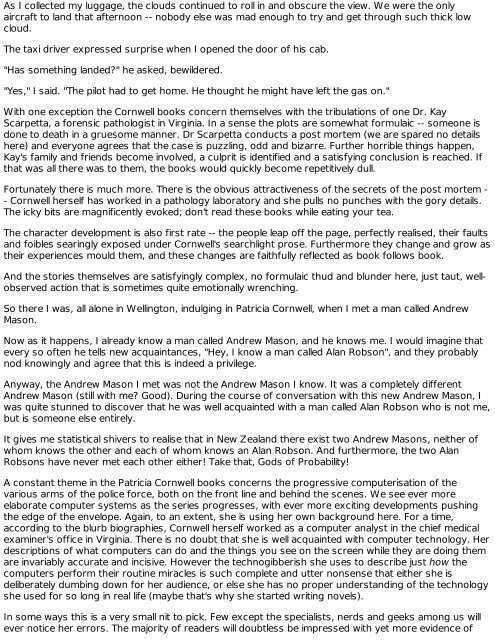Triffids Beard 2 - The Bearded Triffid
Triffids Beard 2 - The Bearded Triffid
Triffids Beard 2 - The Bearded Triffid
Create successful ePaper yourself
Turn your PDF publications into a flip-book with our unique Google optimized e-Paper software.
As I collected my luggage, the clouds continued to roll in and obscure the view. We were the only<br />
aircraft to land that afternoon -- nobody else was mad enough to try and get through such thick low<br />
cloud.<br />
<strong>The</strong> taxi driver expressed surprise when I opened the door of his cab.<br />
"Has something landed?" he asked, bewildered.<br />
"Yes," I said. "<strong>The</strong> pilot had to get home. He thought he might have left the gas on."<br />
With one exception the Cornwell books concern themselves with the tribulations of one Dr. Kay<br />
Scarpetta, a forensic pathologist in Virginia. In a sense the plots are somewhat formulaic -- someone is<br />
done to death in a gruesome manner. Dr Scarpetta conducts a post mortem (we are spared no details<br />
here) and everyone agrees that the case is puzzling, odd and bizarre. Further horrible things happen,<br />
Kay's family and friends become involved, a culprit is identified and a satisfying conclusion is reached. If<br />
that was all there was to them, the books would quickly become repetitively dull.<br />
Fortunately there is much more. <strong>The</strong>re is the obvious attractiveness of the secrets of the post mortem -<br />
- Cornwell herself has worked in a pathology laboratory and she pulls no punches with the gory details.<br />
<strong>The</strong> icky bits are magnificently evoked; don't read these books while eating your tea.<br />
<strong>The</strong> character development is also first rate -- the people leap off the page, perfectly realised, their faults<br />
and foibles searingly exposed under Cornwell's searchlight prose. Furthermore they change and grow as<br />
their experiences mould them, and these changes are faithfully reflected as book follows book.<br />
And the stories themselves are satisfyingly complex, no formulaic thud and blunder here, just taut, wellobserved<br />
action that is sometimes quite emotionally wrenching.<br />
So there I was, all alone in Wellington, indulging in Patricia Cornwell, when I met a man called Andrew<br />
Mason.<br />
Now as it happens, I already know a man called Andrew Mason, and he knows me. I would imagine that<br />
every so often he tells new acquaintances, "Hey, I know a man called Alan Robson", and they probably<br />
nod knowingly and agree that this is indeed a privilege.<br />
Anyway, the Andrew Mason I met was not the Andrew Mason I know. It was a completely different<br />
Andrew Mason (still with me? Good). During the course of conversation with this new Andrew Mason, I<br />
was quite stunned to discover that he was well acquainted with a man called Alan Robson who is not me,<br />
but is someone else entirely.<br />
It gives me statistical shivers to realise that in New Zealand there exist two Andrew Masons, neither of<br />
whom knows the other and each of whom knows an Alan Robson. And furthermore, the two Alan<br />
Robsons have never met each other either! Take that, Gods of Probability!<br />
A constant theme in the Patricia Cornwell books concerns the progressive computerisation of the<br />
various arms of the police force, both on the front line and behind the scenes. We see ever more<br />
elaborate computer systems as the series progresses, with ever more exciting developments pushing<br />
the edge of the envelope. Again, to an extent, she is using her own background here. For a time,<br />
according to the blurb biographies, Cornwell herself worked as a computer analyst in the chief medical<br />
examiner's office in Virginia. <strong>The</strong>re is no doubt that she is well acquainted with computer technology. Her<br />
descriptions of what computers can do and the things you see on the screen while they are doing them<br />
are invariably accurate and incisive. However the technogibberish she uses to describe just how the<br />
computers perform their routine miracles is such complete and utter nonsense that either she is<br />
deliberately dumbing down for her audience, or else she has no proper understanding of the technology<br />
she used for so long in real life (maybe that's why she started writing novels).<br />
In some ways this is a very small nit to pick. Few except the specialists, nerds and geeks among us will<br />
ever notice her errors. <strong>The</strong> majority of readers will doubtless be impressed with yet more evidence of


